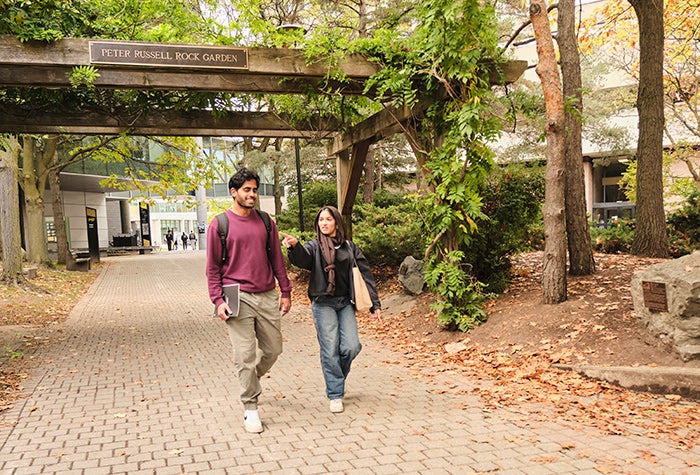Written by Zahra (she/her), student
Being a healthy human being is about a lot more than just eating healthy and being physically active, although those are a big part of it.
Human health also includes being spiritually, mentally, and socially well. It’s important to have a sense of meaning and purpose to your life, and to not be stressed all the time. It’s important to do things, go places, and spend time with people that make you happy.
It’s important to be happy, even when you’re a student. Try to live in the moment and enjoy it, because you never know how things could change.
What works for you is unique to you

Before discussing all the resources that are available to you, or before you research them on your own, you should figure out what works for you – what helps you de-stress. Personally, physical exercise helps clear my head.
I’m an avid runner, cyclist, and strength trainer. All these things help me refocus, collect my thoughts, and make me feel better about everything crazy that’s happening around me. Basically, I like stressing my body out for an hour or two, instead of my brain/mind.
However, I have friends who have the exact opposite experience – it actually makes them more stressed to go to the gym or to workout. If they're working out, it’s simply because they want to stay physically fit, not necessarily for the sake of their mental fitness. They prefer other activities to de-stress, such as socializing, dancing, watching movies, or baking.
Staying mentally healthy in high school
Although I know you’re curious about mental health in a university context, I think it’s also important for me to talk about your mental health as a high school student. When I think back to high school, I remember being crazy busy with my two part-time jobs, extracurriculars, school, social commitments, and of course, worrying about getting into the university and program of my choice.
You probably have similar worries right now, and yours could be even more (or less) distressing, based on your circumstances. Either way, there are a lot of things you can do to stay healthy! Trust me, keeping yourself sane and mentally fit will benefit you in every aspect of your life (not just school).
Depending on your lifestyle and personality, you may prefer some things on the list below more than others, but I encourage you to try as many as you can, until you discover the perfect mix of activities.

Lead an active lifestyle
Take a physical education or power fit class (offered at almost all Ontario high schools) to keep yourself moving throughout the day. You could also try out for a sports team, or if you prefer something more relaxed or less competitive, consider intramural activities. I helped run these at my high school during the lunch hour and/or after school as a part of Athletic Council.
Quiet space
Find or ask about a quiet area at your school where you can go to relax when you need it. The guidance office can provide you with more information about this. It can feel really good to take a breather and step away from the craziness of school.
Talk to someone
I know it can feel like your parents don't understand your problems, and truth be told, they probably don't. However, they really care about you and want to hear about your problems. Sharing your challenges can be a process of releasing, and thereby providing relief from, strong or repressed emotions.
You can also find a mentor, older brother/sister, or someone else you can trust to help talk you through any of your worries.
You are what you eat
If you're eating unhealthy food, you're likely not going to feel your best.
Try to eat healthy and unprocessed foods, to boost your mood and overall well-being. It can also be relaxing to make your favourite meals or snacks.
You’ll be glad you did because it’s an important skill to have before coming to university and living on your own.
Sleep more
Most people need seven to nine hours a night, so ensure you’re getting enough sleep. It’ll improve your physical and mental health, and boost your mood throughout the day.
Spend time with friends
The sad truth is that you may not see a lot of them if you all go to different universities or colleges. Why not make great memories with them now, so you don't feel like you missed out in your high school years.

Mental health at Waterloo
The University of Waterloo has plenty of resources to help you with everything mental health.
Counselling Services provides mental health professionals you can talk to in a private and confidential setting (even when you’re on a co-op term). If you’re not yet on campus though, they also have helpful resources you can use.
- Self-care means achieving a balance between the chaos and calm within your life by adding in activities or hobbies that make you happy.
- How to help a friend who’s feeling lonely/upset/depressed — it’s not always you who’s feeling low, so it’s important to know how to take care of the people you care about.
- What to say to people who compare themselves to others. When I find myself drawing comparisons, I ask myself whether I care about the same things that person does, and if our priorities and values align. Most of the time, the answer is no. You may place a greater importance on your grades, and your friend cares more about their athleticism, which means they’ll be better at some things, and you’ll be better at others.
- How to make friends and meet new people. This becomes important as you come to university because there will be a lot of new faces, and you’ll probably want to make new friends. Having friends is a good thing, and being social is an important part of keeping yourself mentally healthy. If you want to make friends with interests similar to yours, I would recommend finding a club on campus for that interest, e.g., robotics, dancing, poker, cheese – yes, Waterloo has all of those!

We also have a Health Services department. Their mission is “caring for our students is the number one reason we are here,” which sounds pretty solid to me. They offer services such as
- The Student Medical Clinic – health care services (everything you’d get with your family doctor). They have both male and female doctors and nurses.
- Nutrition Services – registered dietitian, healthy food recommendations and meal-prepping help for special dietary restrictions (e.g., lactose intolerance, gluten-free, vegan).
- Travel Clinic – provides travel consultations, which will ensure you have the proper vaccinations and are taking the proper precautions for your specific destination.
- Urgent Help – list of emergency contacts which can be important if you thought you or others were in a crisis or felt that you would hurt yourself or others.
Another resource I recommend is the Campus Wellness Database. It has lists for all kinds of support — academic, accessibility, spiritual, and peer support. It also has information on workshops and seminars you could attend to better understand, and aid, your mental health and overall wellness.
At Waterloo, mental health is a priority and there are so many health and wellness resources in place to support you once you get here. So with that in mind, I hope my advice helps you to get started on leading a healthy life now. Remember to take those breaks, stay active, and reach out for help, sooner rather than later!
Related articles

Health and wellness supports at Waterloo you should know about
Being a healthy human being is about a lot more than just eating healthy and being physically active, although those are a big part of it.

How to deal with stress in healthy ways
Dealing with stress can be stressful on its own. You have to figure out how to cope with it while also looking for ways to eliminate it, not to mention dealing with the thing that’s actually causing the stress.

Ways to counter self-doubt
Self-doubt is a feeling that can be all too familiar to students at all levels. This is a mental state where you are caught between believing you can and believing you can’t do something.
